Last-Minute NYC Holiday Gift Guide 🎁
We’ve created a holiday gift guide with presents for the intrepid New Yorker that should arrive just in time—



With its many celebrated restaurants and food festivals, Brooklyn can stake a serious claim to being New York City’s food center. Though the borough touts esteemed restaurants like Peter Luger Steak House and Chez Ma Tante, a number of innovative food companies, including many immigrant, family-run enterprises are often overlooked. These culinary inventors bring their cultural heritage to the borough with an assortment of chocolates, wines, whiskeys, olive oils, tahini, spices, ice cream, and produce.
Here are a few small Brooklyn companies that showed their wares at the Javits Center’s Fancy Food Show, the largest food show in the country, and called by Chef George Duran on Good Morning America “a foodie’s Disneyland.” Food companies come to showcase their imaginative new products, which this year seemed to mean advances in making plant-based food delicious as well as nutritious.
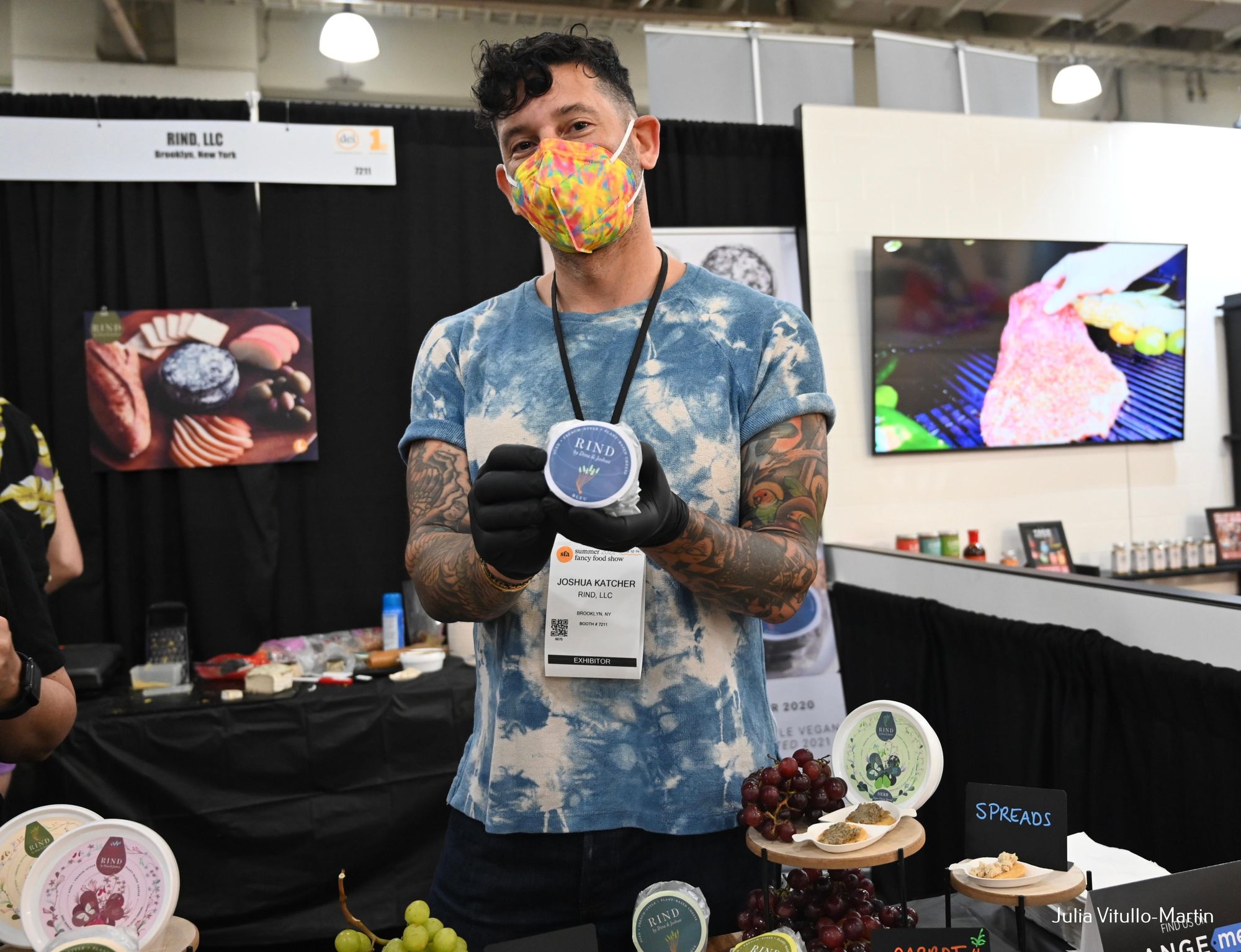
“We started out loving traditional, soft-ripened, French cheese,” Joshua Katcher, co-founder of RIND said. “But then we became vegans. Did we have to give up French-style cheese? Not at all.” Instead, Katcher and his partner, Dina DiCenso, set about developing a proprietary formula to make delicious cheese using a plant-based cream base instead of mammalian milk.
The cheese has won many awards and even passed the high standards set by Cook’s Illustrated Magazine, which decided that the market for vegan cheese was so strong it better take a closer look. It chose nine of the most well-regarded vegan cheeses in the country and ran a taste contest. The magazine named RIND’s Classic Cambleu “The Best Blue Cheese-Style Vegan Cheese,” praising it to be “earthy, funky, pleasantly briny and sharp. Ultrasmooth and creamy.” Or, as The Boston Globe wrote about the Camembert, “With dark bleu veins runnings through its rind, like a blue cheese, this cheese’s interior is soft, buttery, and yeasty. You might not guess by its appearance that the wedge is actually plant-based and vegan.”
And you wouldn’t. Unlike most past vegan attempts, RIND products are good enough to be partnered with the best chefs. Belse, a trendy downtown restaurant, serves it on a cheese plate, where it is elegantly at home with raisins on the vine, seasonal preserves, and house-pickled vegetables. This cheese is in a whole new class of its own.
For the carnivores among us, RIND offers a more plebeian cheese, Carrot Cheese Slices, which has a “Creamy, robust and cheesy flavor,” according to RIND. The cheese, which is a perfect substitute for American cheese on traditional hamburgers, has a “melty, gooey and luscious texture when heated.” Carrot Cheese won the 2022 New Product award from the Specialty Food Association.
RIND’s plant is in Brooklyn, but because the environment must be strictly controlled for health purposes, the company is unable to entertain visitors — no unwanted bacteria is allowed. Beyond their company, both co-founders are deeply involved in Brooklyn life. DiCenso founded Gristle Tattoo, an all-vegan tattoo studio in East Williamsburg, and Brooklyn Nurse Practitioners, a plant-based primary care clinic. Katcher is a designer, educator, and author who created the website, The Discerning Brute in 2008, and the elegant Brave GentleMan label in 2010. He also wrote Fashion Animals in 2019.
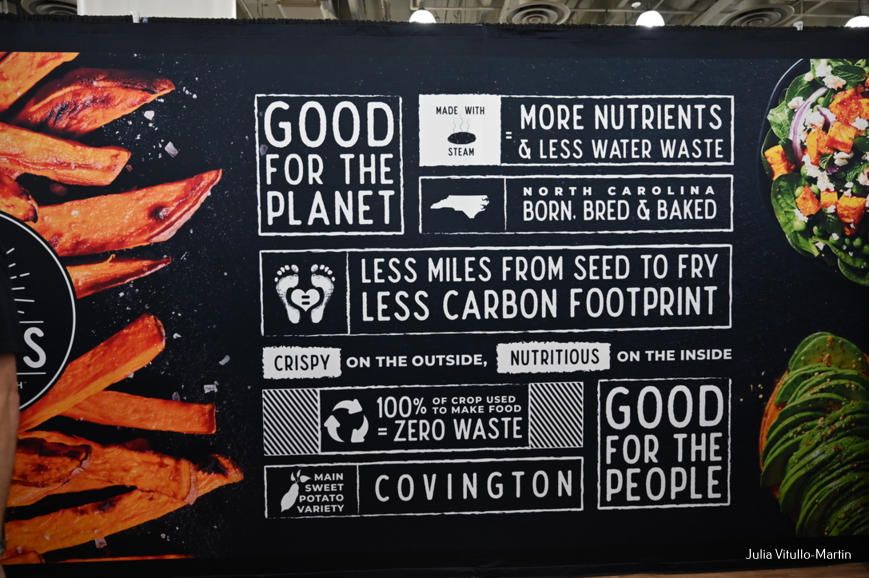
“Our sweet potato fries are the cleanest and crispiest on Planet Earth,” Alec Warren, executive director of Roots Farm Fresh, said. “While most fries are boiled, we only use steam, which keeps our fries crispy on the outside and nutrient-rich on the inside.”
Headquartered in Dumbo, Brooklyn, Roots Farm Fresh stands behind the motto “Work hard. Be kind. Eat sweets.” The company’s first secret, according to Warren, is its base product — a scrumptious sweet potato called a Covington that is, according to Roots, “born, bred & baked” in North Carolina. Warren calls the state the mecca of sweet potato growing: “Our factory is within 50 miles of the fields where our potatoes are grown. We formed a collective, partnering with local growers, which means fewer miles from seed to fry and a smaller carbon footprint. We use 100% of our crop and aim for zero waste.”
To those who love it, the sweet potato is a thing of unconventional beauty. Chef Duran is unconvinced of the beauty but says that Roots performs a public service by converting “all the ugly sweet potatoes that people don’t want in the market” into tasty toasts and croutons. He was especially taken with the sweet potato crouton, which is part of Roots’ waste-free campaign: “Good for Our Families and Good for the Planet.” Warren sees the goal of the campaign as to distribute an array of products that give health-conscious consumers a way to enjoy sweet potatoes at every meal. Not to mention, all the products are gluten-free, non-GMO, vegan, allergen-free, Kosher, and Halal.
Despite the rural nature of its product Roots maintains its headquarters in Brooklyn because “Brooklyn is cool,” Warren said. “It has ready access to media outlets, and it has a great food scene. A lot of other founders are here. We meet and inspire one another through a company called Naturally New York, which brings people together.”
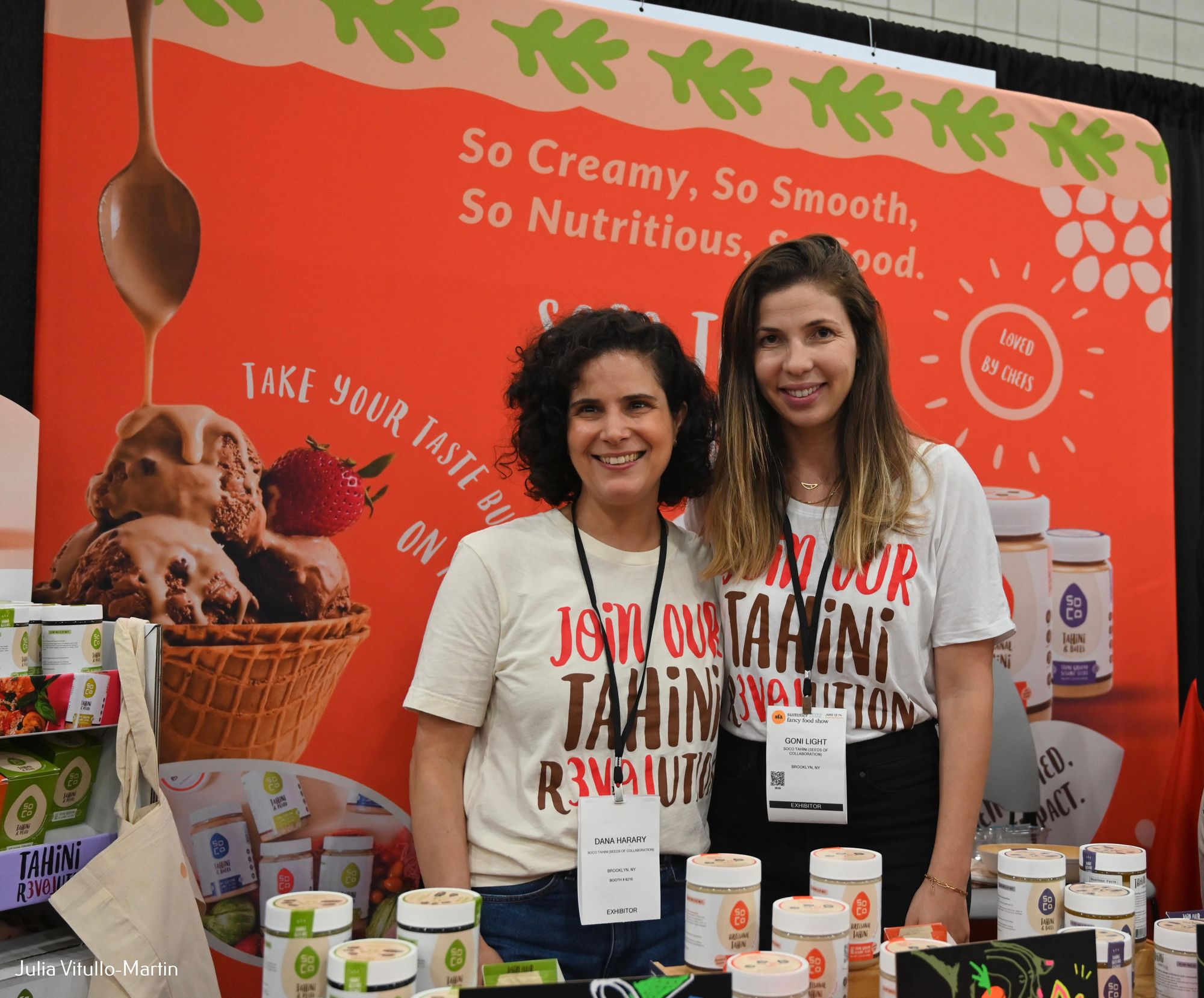
Tahini — toasted sesame seeds ground into a paste — is one of those miracle products most people look for: delicious, versatile, low in calories but high in protein, fiber, and important vitamins and minerals. Arabic for “sesame seed butter,” tahini was praised by Herodotus some 3500 years ago and was listed as an ingredient of hummus in a 13th-century Arabic cookbook. Tahini is both old and a fundamental part of Middle Eastern heritage. Yet when two young Israeli entrepreneurs, Goni Light and Dana Harary, moved to Brooklyn, they couldn’t find the creamy, rich tahini they had grown up with. What to do? Start a company and supply your own.
Headquartered on Brooklyn’s Bedford Avenue, SoCo Tahini distributes a range of products overseen by their Palestinian partner at a manufacturing facility in Nablus on the West Bank. “Our partnership is in every jar,” co-founder Goni Light said. “We think that economic collaboration is the best way to build bridges between communities in conflict.” In addition, SoCo contributes to communal cooperation by donating 1 percent of its proceeds to Middle East Entrepreneurs of Tomorrow (MEET), a nonprofit based at MIT that connects young Israelis and Palestinians by “using the common language of technology and entrepreneurship.” They hire MEET alums to work at SoCo, and host a summer seminar in Jerusalem to showcase different entrepreneurs.
SoCo offers three flavors, all with 100% stone-ground, dry-roasted sesame seeds: Artisanal is classic, and nothing but sesame seeds; Tahini & Pesto combines tahini and nut-free pesto, that can be substituted as a pasta sauce; Tahini & Dates adds a bit of sweetness that converts it to a “reimagined PB&J,” perfect for Americans looking for a hip update for a favorite childhood product. All flavors are vegan, nut-free, and gluten-free.
“In Middle Eastern countries, tahini is considered a superfood,” says Goni Light, pronouncing the magic word for the contemporary zeitgeist.
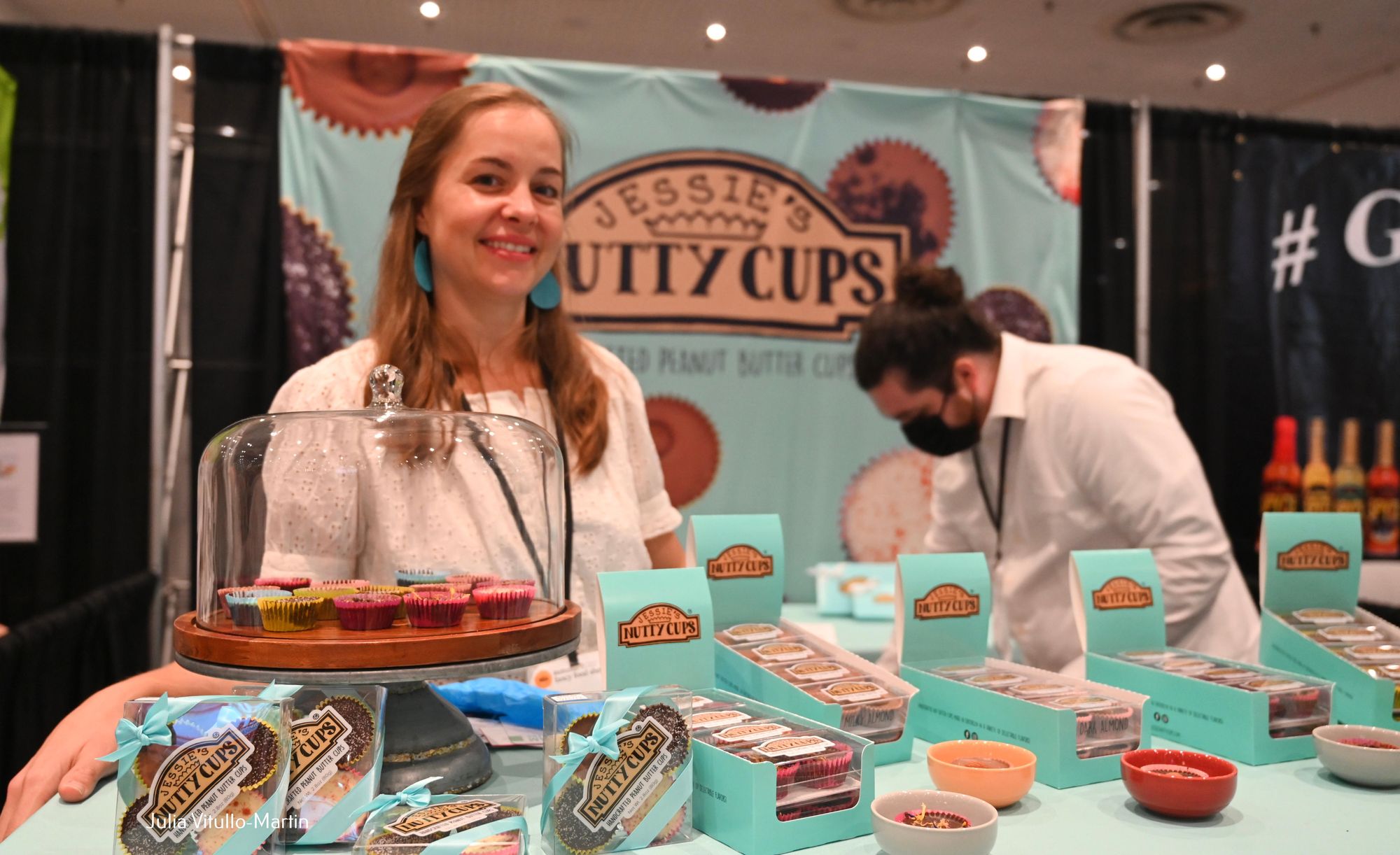
Even though peanuts are legumes rather than nuts as they grow in the ground, peanuts are the top snack nut in the United States, capturing two-thirds of the market. Peanut butter, thought to have been invented by the Aztecs some 3500 years ago, is an ancient American product that is now at an all-time high in United States consumption.
As a peanut lover herself Jessica Taige, an actor and singer with Broadway ambitions, spontaneously made batches of Reese-like peanut-butter cups for a 2014 farewell party celebrating her roommate’s major out-of-town gig. The cups were such a sensational success that Taige pondered improving the recipe, substituting the best-available chocolate, and retailing the cups as a business.
While supporting herself with restaurant jobs and getting advice and inspiration from Brooklyn’s entrepreneurial food community, she spent two years planning her business and experimenting with recipes. With the help of a FedEx Small Business Grant, she was able to hire and train an employee to oversee all aspects of production in 2021. The result: Jessie’s Nutty Cups, which offers ten flavors, including the Original, the highly urbane Dark Sea Salt Cup, the over-the-top Nutty Rocky Road Cup, and the sublime Choco-Hazelnutty Cup. When asked if life is worth living without chocolate and peanut butter, Jessie’s answer is: “Errrrrrr….NO!”
Jessie’s Nutty Cups are sold across the country, but in New York are available at Agata & Valentina, Chelsea Market Baskets, Murray’s Cheese Shop, and many others.
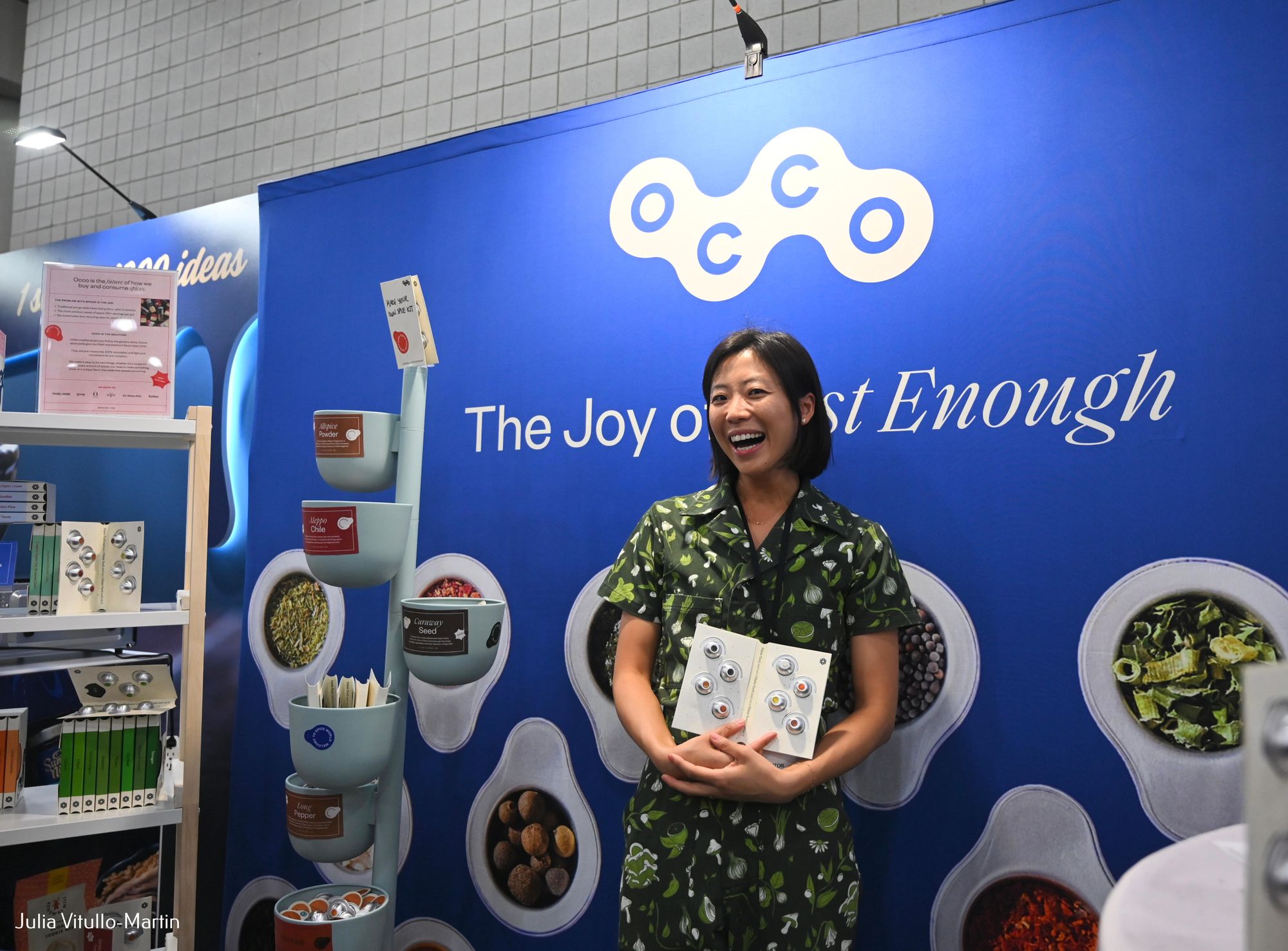
The elegant small cards produced by Occo contain eight half-teaspoon, pre-measured spices sealed into what Occo co-founder Cynthia Wang calls “forever-fresh aluminum pods.” Starting at $5, cards come in chiles, cinnamons, herbs, peppers, and essentials. All spices are purchased from transparent, sustainable supply chains of small-scale spice merchants who have spent years building relationships with farmers. “Fair trade,” “small batch,” and “organic” are Occo’s by-words.
The name Occo is derived from the Italian: abbiocco, meaning a food coma or the sleepy feeling you get after a big meal. Despite abbiocco’s implied bounty, “The Joy of Just Enough” is based on precision, helping cooks get exactly the amount of spice they need so that they’re able to cook with fresh, ethically sourced spices at a fair price.
Occo also seeks to reduce packaging and food waste, pointing out that 40 percent of food produced in the United States is wasted. With 75 percent of aluminum in every produced still in use today, it is the most recycled and most recyclable material on earth. The pods themselves can and should be easily recycled by consumers, who can toss them into soda cans. The paperboard is also easily recyclable.
In addition to the basic cards, Occo offers “Chef Decks” containing seasoning for recipes developed by Occo’s celebrity chef partners, including Chef Nina Compton’s Creole Bistro, Chef Asha Gomez’s Cook in Color, and Chef Adriana Urbina’s Grand Latin American.
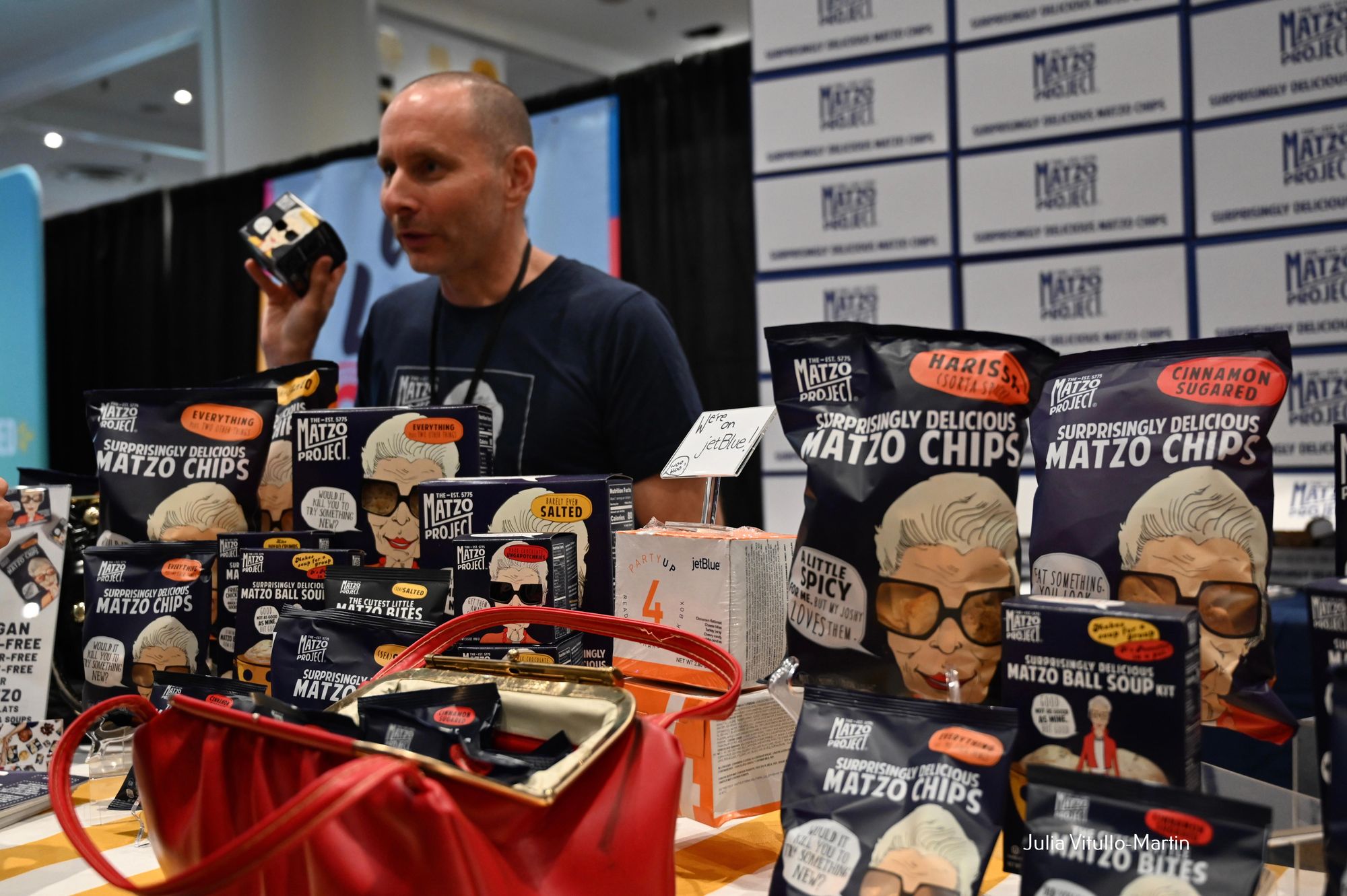
“Would it kill you to try something new?” asks the grandmother of Matzo Project, co-founder Ashley Albert, in one of her many humorous queries supporting Albert’s “surprisingly delicious matzo chips.” With your charming grandmother on your side, how can you go wrong? Plus the chips are vegan, nut-free, dairy-free, and all-natural.
Perhaps because the matzo chips are so good or perhaps because Albert (owner of the Royal Palms Shuffleboard Club in Gowanus) and co-founder Kevin Rodriguez are so charming, the chips have gotten highly favorable press. Not to mention they have earned industry acclaim from the James Beard House, Balabouusta Soho, and the Conan O’Brien Green Room. “People (who aren’t even related to us!) are saying such NICE THINGS!!” says Kevin.
As the Wall Street Journal‘s Charles Passy points out, matzoh isn’t your typical epicurean delight: As the “bread of affliction,” it has been compared with everything from toasted cardboard to hardtack. The matzo chips are tasty, but also, unlike matzo itself, have year-round appeal.
Like so many food entrepreneurs, Rodriguez and Albert started small, making a trial batch in Kevin’s kitchen. The partners released a tiny batch to three stores in Brooklyn and Manhattan that sold out within hours. They now operate out of a large Kosher bakery in Sunset Park.
Today, you can buy the chips at 100 stores in 20 states, including notable markets like Zabar’s, Schaller & Weber, Whole Foods, Murray’s Cheese, and Foragers City Grocer, not to mention hipster meccas like Dylan’s Candy Bar. If you prefer to make your own matzos you buy their Matzo Ball Mix and Soup Kit. Oprah Magazine writes, “Do not Passover these treats.”
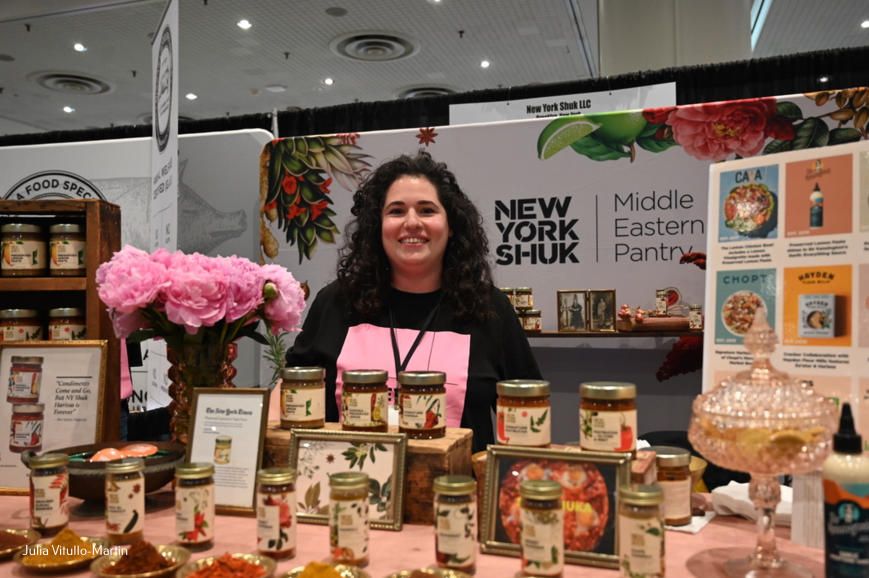
“We are a Brooklyn-based maker of handcrafted Middle Eastern pantry staples,” NYShuk said. Its pantry includes the Harissa Collection, Middle Eastern Spice Collection, Cracker Collaboration with Hayden Flour Mills, and Preserved Lemon Paste. For Brooklyn’s DIY world, it offers couscous kits and their Moroccan tea set, with abundant recipes accompanying each item.
Founders Leetal and Ron Arazi are of mixed Middle-Eastern heritage. Leetal’s Turkish grandmother is a Sephardic descendant, her last name being Toledo, like the city in Spain. She carried a Spanish passport, and her family spoke Ladino at home. Leetal’s ancestors were chefs. Ron, himself a chef, is half Moroccan, half Lebanese. Both are now Brooklynites, living in Bed Stuy. NYShuk is headquartered between Bushwick and Bed Stuy. They sell their products, teach cooking classes, and host pop-up dinners, all as part of their mission to “take Middle Eastern flavors out of the Middle East and into everyday cooking.”
NYShuk’s current drive is to enhance American appreciation for Matbucha, which means “cooked salad” in Arabic. A Maghrebi tomato and pepper dish that is served as an appetizer or mezze dish, Matbucha is flexible in its seasoning. For traditionalists, NYShuk has a classic Matbucha, made with tomatoes, Hatch chile peppers, garlic, and paprika. Calling Matbucha the “‘It’ condiment that belongs on your food shelf, Food52 singled out for praise Shuk’s “unorthodox option featuring olives and mint, which aren’t common ingredients in the classic recipe.”
Departures Magazine calls the Preserved Lemon Past “sunshine in a jar.— if the sun was feeling a little crazy that day, perhaps dangling askew and singing a song.” The lemon paste is highly versatile and can be mixed, Departures said, with Greek yogurt, or added to a leek and turnip soup, or spread on crusty toast. New York Magazine’s Strategist took Preserved Lemon Paste to a new hip level, dubbing it PLP, and praising it as a base for club soda and/or gin, an ingredient of olive-oil cake, or a sauce for pork chops.
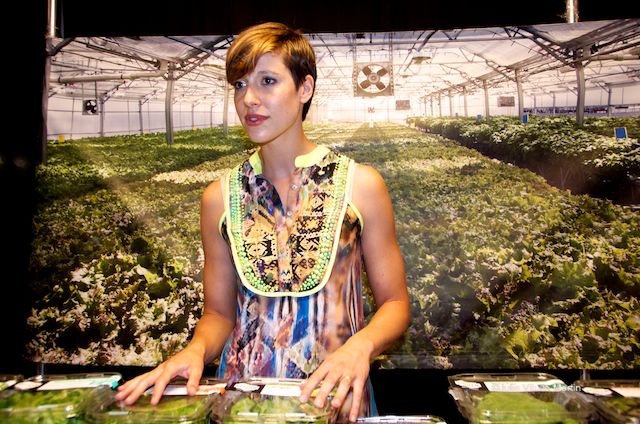
Untapped New York has covered Brooklyn food for many years. In 2014, we wrote about Gotham Greens, which was then presenting its wares at the annual food and beverage trade show hosted by the Brooklyn Chamber of Commerce. In those days Gotham Greens was a tiny fresh food company farming on Brooklyn roofs. “We are farmers that live in apartments. We see green fields where others see rooftops,” said its website, baldly appealing to local patriotism.
Today, Gotham Greens builds and operates sustainable greenhouses, operating one of the largest networks of high-tech hydroponic greenhouses in North America. It has raised more than $310 million in new capital, bringing its total financing to over $440 million since 2009.
In 2014, we wrote, “Did anyone predict urban agriculture could be profitable before 2010, when the Brooklyn Grange opened its soil farm on the roof of a 43,000-square-foot building in Queens, and Gotham Greens built its commercial-scale greenhouse on the roof of a warehouse in North Brooklyn? Using hydroponic technology—nutrient-rich, reusable water instead of soil—Gotham Greens has since opened a greenhouse on the roof of the Whole Foods in Gowanus, and will soon operate a third in Jamaica, Queens.”
In 2015, Gotham Greens expanded to Chicago, building a 75,000-square-foot greenhouse to serve the Midwest. In 2019, it added Providence and Baltimore, expanding its distribution to 40 states. Denver, serving the Mountain region, opened as the eighth greenhouse in 2020, and a site at the University of California-Davis became the 9th. By 2023, Gotham Greens projects that it will own and operate 13 high-tech, climate-controlled hydroponic greenhouses, totaling more than 40 acres (1.8 million square feet) across nine states.
“We concentrate on perishable crops,” Nicole Baum, Marketing & Partnerships Manager at Gotham Greens, told us in 2014, “especially the lettuces that must be shipped long distances, from Latin America and California, and the herbs that are so treasured by today’s cooks.” In place of long-distance transport, they simply carry the products down from the roof, converting “food miles to food footsteps,” said Gotham Greens co-founder Viraj Puri.
Get in touch with the author @JuliaManhattan.
Next, check out the oldest bars and restaurants in Brooklyn!
Subscribe to our newsletter